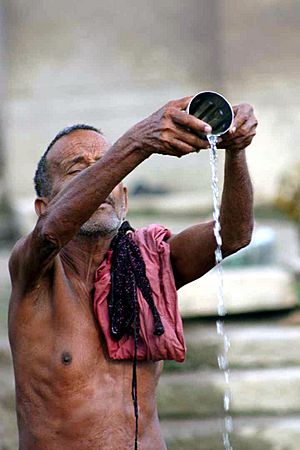Puja (Hinduism) facts for kids
Pūjā is a special prayer ritual done by Hindus. The word "Pūjā" comes from an ancient language called Sanskrit. It means showing respect, honor, and worship. During a Pūjā, people honor one or more gods or goddesses. It's also a way to spiritually celebrate important events. Sometimes you might see it spelled as pooja or poojah. Pūjā is the most common way Hindus worship. It can also be done to honor special guests or remember people who have passed away. Pūjā rituals are also practiced by Buddhists, Jains, and Sikhs.
Contents
Why Do People Do Pūjā?
People perform Pūjā for many reasons. The main goal is to connect with the divine and show love and devotion to God. It's a way to express thanks for blessings received. People might also do Pūjā to ask for help, guidance, or good fortune. It can bring a sense of peace and spiritual well-being.
Where Does Pūjā Take Place?
Pūjā can happen in many different places. Many families have a special altar or shrine in their homes where they perform daily Pūjā. This allows them to connect with their faith every day. Pūjā is also performed in temples, which are places of worship for the community. During festivals or special occasions, Pūjā might take place outdoors or in larger community halls.
What Is Used in a Pūjā?
Many different items are used during a Pūjā. These items are often symbolic and help create a sacred atmosphere.
- Offerings: People offer things like fresh flowers, fruits, sweets, and water. These are called prasad and are later shared among family and friends.
- Light: Lamps or candles are lit to symbolize knowledge and the presence of God.
- Incense: Incense sticks are burned for their pleasant smell, which helps purify the air and create a calm mood.
- Sounds: Bells are often rung to invite the deities and clear the mind. Chanting of sacred sounds or mantras is also common.
- Water: Water from sacred rivers, like the Ganges, is often used for purification.
Types of Pūjā
There are many different types of Pūjā, depending on the occasion and the deity being honored.
- Daily Pūjā: Many Hindu families perform a short Pūjā every day in their homes. This is a way to start the day with devotion.
- Festival Pūjā: During major Hindu festivals like Diwali or Navaratri, special and elaborate Pūjās are performed. These often involve many people and can last for hours.
- Special Occasion Pūjā: Pūjā can also be done for important life events. These include weddings, births, or moving into a new home.
Pūjā is a beautiful and meaningful part of Hindu life. It helps people feel closer to their faith and traditions.
Images for kids
See also
 In Spanish: Puja (hinduismo) para niños
In Spanish: Puja (hinduismo) para niños
 | Emma Amos |
 | Edward Mitchell Bannister |
 | Larry D. Alexander |
 | Ernie Barnes |





